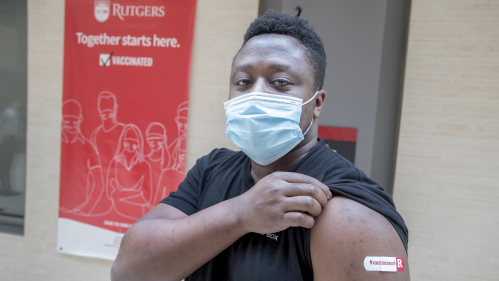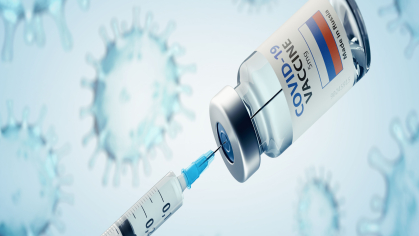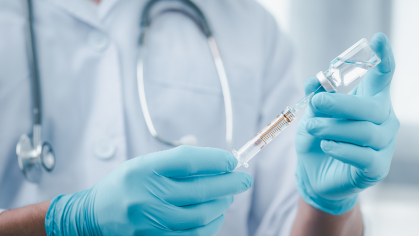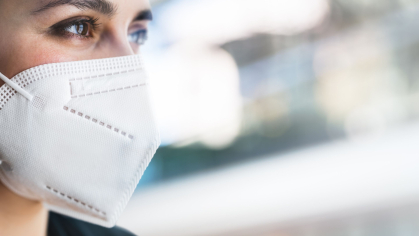Rutgers Expert Addresses Questions on COVID-19 Vaccine Rollout and Variant Issues

Stanley H. Weiss, an epidemiologist in infectious and chronic diseases stresses the importance of getting vaccinated
Now that COVID-19 vaccines are widely available across the country, Stanley H. Weiss, an epidemiologist in infectious and chronic diseases, and a professor at the Rutgers New Jersey Medical School and the Rutgers School of Public Health, talks about vaccine side effects, the hesitancy that still exists and why it is important to get vaccinated.
Will the vaccines protect against current virus variants and strains that may arise?
Emerging preliminary data indicate that several vaccines work fine against some of the new mutations, including those now becoming common in the USA. The manufacturers of the COVID-19 vaccines that used long viral sequences evoke a broad response, both the new technology based on mRNA and other vaccine platforms, can quickly develop and produce boosters that are expected to address new strains. There is concern that the current vaccines may not sufficiently protect against other evolving variants from around the world. No country is truly isolated, so worldwide control is critical to gaining control over the pandemic.
The federal regulatory structure will need to adjust for rapid approval and deployment of boosters, or combined vaccines, based on initial phase 1, 2, and 3 trial studies demonstrating safety and surrogate efficacy endpoints, with the addition of new, much more vigorous Phase 4 monitoring and assessment efforts for efficacy and safety.
The great thing about the spike protein of the coronavirus is that there are multiple spots on the spike protein sites to which your body can evoke a useful antibody response, as well as cellular immunity. Even if the mutations change the protein and a particular antibody no longer recognizes it, there are likely to remain other places that your body will remember and react to. Although a more drastic change, with a whole new sequence, might occur at any time, steps are ratcheting up to monitor and detect new variants. The vaccine manufacturers express confidence they can start making new vaccines rapidly and roll them out faster. We can pivot vaccines in many different directions to make them more effective. Due to theoretical concerns about phenomena such as ‘original antigenic sin,’ in the near term clinical trials will remain necessary. The FDA has taken an important step forward in examining expansion of its regulations to enable rollout of analogous vaccines geared to variants incorporating surrogate endpoints, which will need to be in conjunction with robust monitoring after deployments.
Should people who had been infected with COVID-19 still get the vaccine?
If people were ill from COVID-19, we know that not all are protected from being re-infected. In South Africa, data from vaccine trials showed there was limited protection to the new South African variant. We do not know how well immunity will last after being infected.
For some infectious diseases, immunity after natural infection is stronger than vaccine immunity, but that does not seem to hold with COVID-19 disease. I don't trust that previously infected persons will have complete enough protection from their past infection, and think those who were infected need to be vaccinated. My analysis of public trial data demonstrates that those who were never symptomatic but have blood tests indicating specific antibodies should definitely be vaccinated, as their risk is close to unvaccinated persons without antibodies. The data remain limited on whether to vaccinate those who have had symptomatic COVID-19, the timing and whether one or two doses are needed for them. Since clinical decisions need to be made for many persons now, my recommendations are guided by the evolving clinical trial and immunological studies.
Should people delay in getting the second vaccine shot, and how safe is it if that happens?
First, I recommend that the rare person who develops a severe reaction to a first vaccine shot should not get a second dose of that vaccine. Secondly, there is some controversy about the optimal timing of a second dose, and the data are limited. Data from phase 3 vaccine clinical trials and many other immunology labs show that the second dose greatly boosts the immune response.
I'm concerned that a substantial delay of the second dose could leave people susceptible during pandemic rates of spread. It also poses the theoretical risk of helping new variants emerge that could be resistant to vaccines.
At this time, I recommend adherence to the dosing schedule recommended by the vaccine manufacturers and authorized under their emergency use authorizations without modification. Until new data on other time schedules is developed and carefully reviewed, I advise no change in timing.
Can you still test positive after getting a COVID-19 vaccine? If so, how does this happen?
The COVID-19 vaccines do not introduce live viral infection, so the tests looking for direct evidence of the virus – such as by PCR or the fast antigen tests - will be negative.
Some vaccines have shown 95 percent efficacy against severe disease two weeks after the completion of two doses. This leaves some people who do still get infected after exposure, especially before that second booster has fully kicked in, and thus they would have a positive test. We do not know the added extent to which asymptomatic infections might occur, sometimes with prolonged carriage of the virus, and carrying the risk of possible infectivity to others, nor the extent the evolving variants will change this.
Natural infection and vaccines induce antibody responses. After natural illness, perhaps 20 percent or so don't develop a robust immune response, and they may not have detectable antibodies on the current commercial tests. Some of these people may nevertheless have robust cellular immunity. The same can happen after vaccination. There are commercial tests available under FDA issued EUA’s that may prove useful, but which must still be treated as investigatory. The primary role of antibody testing should still remain in research studies. We do not currently have enough data that enable those antibody tests to be useful in clinical decision-making, and thus they should not be recommended by physicians or public health authorities. The antibody tests by different vendors also differ considerably.
How soon do you think the U.S. will reach herd immunity?
The new goal set by President Biden to get 70 percent of American adults vaccinated is commendable, as it is necessary for every eligible person to get the COVID-19 vaccine as quickly as possible, even though it won’t be enough to help us get to herd immunity. There will be certain age groups and communities that will have high vaccination rates and thus have excellent protection against the virus and disease. However, it’s those with the low rates that are going to impair more general herd immunity and continue to drive the pandemic spread. There are many factors that impact herd immunity issues, some of which we can’t directly control – such as the transmissibility of a viral strain and the ever-changing nature of the virus during pandemic spread. Societal behaviors and the environments are important, and in theory amenable to improvements. More information remains needed about the possible impact of some complex immunological issues.


